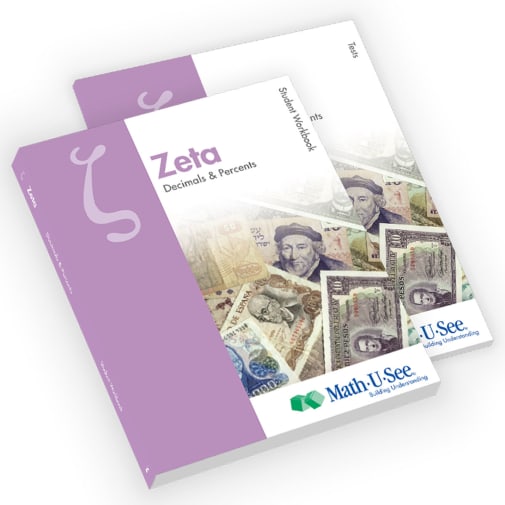The Math-U-See Zeta Student Workbook and Tests include the consumable student resources that are required for the program. The Student Workbook contains a mix of practice problems and word problems. Space is provided to work out the problems, but it may be beneficial for students to have access to scratch paper. The Test Booklet provides an opportunity to evaluate concept mastery. Parents are encouraged to reteach previous lessons if the student has not mastered a concept. Both books are consumable and not reproducible. Each student will need their own Workbook and Test Booklet.
Math-U-See Zeta Student Workbook and Tests
SKU
071179
ISBN
9781608260775
Grade 6-7
Neutral
Medium Teacher Involvement
Multi-Sensory
No other materials needed
Sequential
These icons are designed to help you quickly understand and learn important information about our products.
Teaching Method
Traditional
Teacher-centered curriculum commonly used in classrooms that may include a text, teacher manual, tests, etc.
Charlotte Mason
A methodology based on the work of a 19th century educator who maintained that children learn best from literature (Living Books), not textbooks.
Classical
A methodology based on the Latin Trivium (three stages of learning), including the grammar stage (memorization and facts), logic stage (critical thinking), and rhetoric stage (developing/defending ideas).
Unit Study
A thematic or topical approach centered around one topic that integrates multiple subject areas.
Montessori (Discovery)
A methodology based on the work of a 20th century educator that emphasizes student and sensory-driven discovery learning and real-life applications.
Other
Other methodologies
Religious Content
Secular
Contains content contrary to common Christian beliefs (i.e. evolution).
Neutral
Avoids religious or theoretical topics or presents multiple viewpoints without preference.
Christian/Religious
Faith-based or including instructional religious content.
Learning Modality
Auditory
Learns through listening, talking out loud or reading out loud.
Visual
Learns through seeing, prefers written instructions and visual materials.
Kinesthetic/Tactile (Hands-On)
Learns through moving, doing and touching.
Multi-Sensory
Curriculum that employ a variety of activities/components.
Presentation
Sequential
Curriculum progresses through well-defined learning objectives. Emphasizes mastery before moving to the next topic.
Spiral
Topics and concepts are repeated from level to level, adding more depth at each pass and connecting with review.
Conceptual/Topical
Focus is on the “why,” often with a unifying concept as well as specific skills; coverage may be broader.
Teacher Involvement
Low Teacher Involvement
Student-led materials; parent acts as a facilitator.
Medium Teacher Involvement
A mix of teacher-led time and independent student work.
High Teacher Involvement
Teacher-led lessons; may utilize discussions, hands-on activities and working together.
Additional Materials Required
No other materials needed
Everything you need is included.
Other Materials Required
There are additional required resources that are a separate purchase.
Other Materials Optional
There are additional resources mentioned or recommended but are not absolutely necessary.
Consumable
Consumable
Designed to be written in; not reusable.
Non-Consumable
Not designed to be written in; reusable.
Our Price
$48.00 Product Overview
Teacher materials are necessary to use the student materials and these are sold in Universal or Level Up sets only.
- Consumable student workbook and test booklet for the Math-U-See Zeta program
- Student Workbook includes Lesson Practice, Systematic Review, and Application and Enrichment worksheets
- Tests are designed to ensure mastery; concepts not mastered should be retaught prior to advancing to the next lesson
Description
Publisher's Description of Math-U-See Zeta Student Workbook and Tests
The Zeta Student Pack contains the Student Workbook with lesson-by-lesson worksheets, systematic review pages, and Application and Enrichment pages as well as Zeta Tests. The Zeta level covers decimals and percents and their relationship to fractions, applying core mathematical operations, and other topics.
Category Description for Math-U-See Zeta
Mastery of decimals and percents and their relationship to fractions, applying core mathematical operations. Additional concepts include understanding and simplifying exponents, negative numbers, algebraic expressions, plane geometry and geometric symbols, and ratios.
Lessons follow a similar format – watch the DVD lesson, work through lesson examples in the instruction manual together, and complete worksheets. Lessons conclude with a test. Cumulative unit tests are scheduled regularly to assure students retain previous teaching. A final test over all concepts taught concludes the course.Details
| Product Format: | Other |
|---|---|
| Grades: | 6-7 |
| Brand: | Math-U-See |
| Length in Inches: | 10.875 |
| Width in Inches: | 8.5 |
| Height in Inches: | 1.25 |
| Weight in Pounds: | 3.05 |
Videos
Reviews

